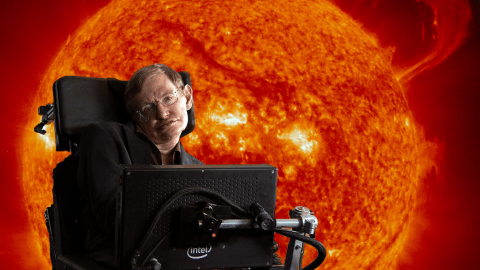Stephen Hawking’s PhD thesis is now available for free

In honor of Open Access Week 2017, The University of Cambridge released one of its most requested theses for everyone to enjoy without having to make a formal request for it; the Ph.D. thesis of Stephen Hawking. Now, anyone who wants to read one of the first works of one of the world’s most famous scientific minds can do so whenever they please.
Hawking, who agreed to make the document available to all, said that,
“By making my PhD thesis Open Access, I hope to inspire people around the world to look up at the stars and not down at their feet; to wonder about our place in the universe and to try and make sense of the cosmos. Anyone, anywhere in the world should have free, unhindered access to not just my research, but to the research of every great and enquiring mind across the spectrum of human understanding.”
Reading Hawking’s Ph.D. paper is like listening to Pink Floyd for decades and then suddenly finding out they had a different and even more groundbreaking debut album. His 1966 thesis, “Properties of expanding universes”, weighed in on the great debate between the supporters of the Big Bang theory and the Steady State theory of the birth and development of the universe. At that time, the physics community was split fairly evenly between the two paradigms. Hawking’s thesis showed that a leading model of the universe which tried to avoid the existence of a gravitational singularity, while also accounting for observed data, was flawed.
Hawking’s thesis argues that the occurrence of a singularity, similar to the one proposed at the time of the Big Bang, is all but inevitable given very general conditions. While he later walked back on that notion, as advances in quantum mechanics changed what could and could not be said about the birth of the universe, his argument was completely sound in 1966.
This, alongside other observational evidence such as cosmic background radiation, helped to sway the scientific community to support the idea of the Big Bang. The early part of his career after graduating was focused on developing the idea further, and we might not have had the Hawking we knew if it wasn’t for this early focus.
It is also worth noting that this thesis was published three years after he was diagnosed with ALS, which he was told would kill him within two years of the diagnosis. It takes on a greater weight, even beyond its considerable scientific merit, when you realize it was being written by a man who knew it might be the last thing he ever did.
Stephen Hawking was once a grad student too, enduring the same miseries that millions of students have endured, with a few extra problems thrown in while he cranked out this work. Now, you can read his thesis here. The University of Cambridge has many other excellent documents available to read online for free, should the mood to read the great thoughts of great minds strike you.





